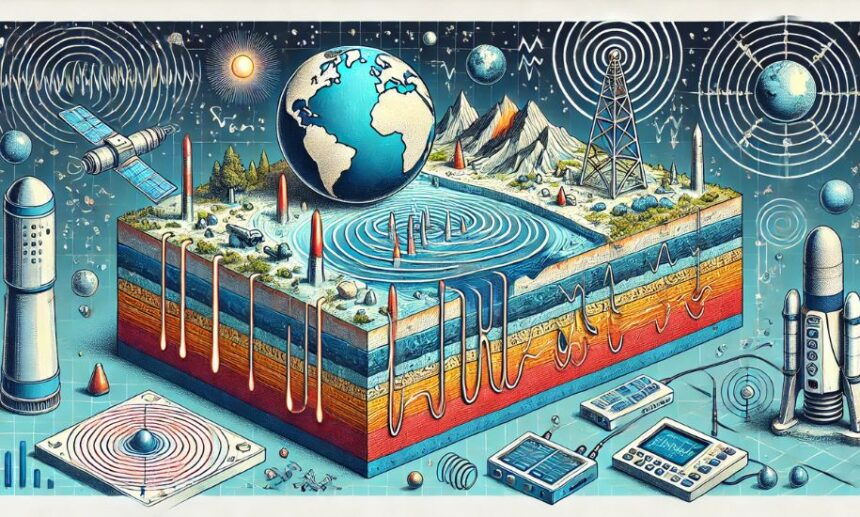Geophysics is a fascinating branch of Earth sciences that delves into the physical properties and processes of the Earth. From the study of seismic waves to the Earth’s magnetic and gravitational fields, geophysics plays a crucial role in understanding our planet. At “Physics Heaven,” we take pride in exploring such topics to bring clarity and insight to our readers.
Geophysics combines principles from physics, mathematics, and geology to investigate the Earth’s structure and composition. It’s a field that not only aids in scientific discovery but also has practical applications in areas like mineral exploration, earthquake prediction, and environmental studies.
The Branches of Geophysics
Geophysics encompasses several specialized branches, each focusing on distinct aspects of the Earth:
- Seismology Seismology is the study of earthquakes and the propagation of seismic waves through the Earth. By analyzing seismic data, geophysicists can determine the location, magnitude, and depth of earthquakes.
- Geomagnetism This branch explores the Earth’s magnetic field. Geomagnetic studies help us understand phenomena like magnetic pole reversals and the interaction between solar winds and the magnetosphere.
- Gravity Studies Gravity studies involve measuring variations in the Earth’s gravitational field. These measurements reveal details about subsurface structures, aiding in resource exploration and tectonic research.
- Geothermal Geophysics Geothermal studies investigate the Earth’s heat flow. This branch is essential for understanding geothermal energy potential and the dynamics of Earth’s interior.
Applications of Geophysics
Geophysics has a wide range of applications that impact industries and communities worldwide:
- Resource Exploration Geophysical methods are widely used to locate natural resources like oil, gas, and minerals. Techniques like seismic reflection and magnetic surveys help identify resource-rich areas.
- Environmental Studies Geophysics assists in detecting groundwater, mapping contamination, and monitoring land subsidence. These studies are critical for sustainable development and environmental protection.
- Earthquake Prediction and Risk Assessment Geophysicists analyze fault lines and seismic activity to assess earthquake risks, contributing to disaster preparedness and mitigation efforts.
- Archaeology Geophysical techniques like ground-penetrating radar are employed in archaeological studies to uncover buried structures and artifacts without excavation.
Technologies Used in Geophysics
Modern geophysics relies on advanced technologies to conduct research and gather data:
- Seismic Instruments Instruments like seismometers and geophones measure seismic activity. These devices are essential for studying earthquakes and subsurface structures.
- Magnetometers Magnetometers measure variations in the Earth’s magnetic field, providing insights into geological formations and mineral deposits.
- Gravimeters Gravimeters detect subtle changes in gravitational force, helping geophysicists map density variations in the Earth’s crust.
- Remote Sensing Technologies Satellites equipped with remote sensing tools gather data on the Earth’s surface and subsurface, aiding in large-scale geophysical studies.
Geophysics in Everyday Life
The impact of geophysics extends beyond academia and industry into our daily lives:
- Earthquake Early Warning Systems Thanks to geophysical research, many regions now have early warning systems that save lives during earthquakes.
- Sustainable Energy Solutions Geothermal energy, a focus area of geophysics, is a renewable resource contributing to sustainable energy goals.
- Improved Infrastructure Planning Geophysical surveys help engineers design safer infrastructure by providing information about ground stability and subsurface conditions.
Challenges in Geophysics
While geophysics offers immense benefits, it also faces challenges:
- Data Interpretation The complexity of geophysical data requires sophisticated analysis methods, which can be time-consuming and resource-intensive.
- Cost of Equipment and Surveys High-tech instruments and large-scale surveys can be expensive, limiting access for smaller research teams.
- Environmental Impact Some geophysical methods, like seismic surveys, may disturb ecosystems. Balancing research with environmental preservation is crucial.
Future of Geophysics
The future of geophysics is promising, with ongoing advancements in technology and methodologies. From exploring other planets to mitigating the impacts of climate change, geophysics continues to push the boundaries of scientific discovery. At “Physics Heaven,” we celebrate this field’s potential to transform our understanding of the Earth and beyond.
Conclusion
Geophysics is a vital scientific discipline that bridges the gap between theoretical research and practical applications. By studying the Earth’s physical properties, geophysicists contribute to resource management, disaster prevention, and environmental sustainability. “Physics Heaven” is dedicated to shedding light on such groundbreaking fields to inspire curiosity and innovation among our readers.
Frequently Asked Questions (FAQs) About Geophysics
What is Geophysics?
Geophysics is the study of Earth’s physical properties and processes, combining physics, mathematics, and geology.
What are the main branches of Geophysics?
Major branches include Seismology, Geomagnetism, Gravity Studies, and Geothermal Geophysics.
How is Geophysics used in resource exploration?
It identifies mineral, oil, and gas deposits through seismic, magnetic, and gravitational surveys.
What technologies are used in Geophysics?
Seismometers, magnetometers, gravimeters, and remote sensing tools are commonly used.
Can Geophysics predict earthquakes?
While it can’t predict exact times, it assesses risk by studying fault lines and seismic activity.
Is Geophysics important in environmental studies?
Yes, it helps in groundwater detection, contamination mapping, and environmental monitoring.
How does Geophysics contribute to archaeology?
Non-invasive methods like ground-penetrating radar uncover hidden structures without digging.
What are the challenges in Geophysics?
Complex data analysis, high equipment costs, and potential environmental impacts.
What is the role of Physics Heaven in promoting Geophysics?
“Physics Heaven” educates readers on geophysics’ importance and encourages scientific exploration.
What is the future of Geophysics?
Advancements in technology will enhance exploration, disaster management, and planetary studies.








